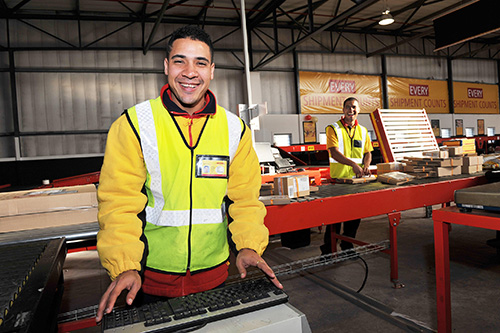SMALL and Medium Enterprises (SMEs) will get a chance to expand their businesses to the global market through a free training in August to be offered by DHL Express.
With SMEs being seen as a hope for addressing the current high unemployment rate, the SMEs will receive training on marketing their products, financing options and how they can ship their products to markets abroad.
Charles Brewer, MD for DHL Express Sub-Saharan Africa said in an interview in Windhoek despite having innovative ideas, SMEs lack knowledge on how to market their products internationally.
“Most of them think sending products abroad is expensive, but it is not as expensive as they think,” he said.
The training exercise will involve the customs department and one of the local banks.
DHL already offers Express Easy, an all inclusive product, which offers one price for SMEs.
Brewer said SMEs should take advantage of ‘brand Africa’ saying that most consumers in developed countries love to buy products associated with Africa.
Brewer who was on his eighth visit to Namibia last week, remains positive about the economic gains of the country.
DHL controls the lion’s share of the country’s freight forwarding sector and is trying to repair its image in Namibia after being battered by bad press as a result of poor service.
Brewer who attended the recent World Economic Forum meeting held in Cape Town, said Namibia’s economic prospects are linked to those of Africa.
Africa has been largely receiving positive coverage in the past few years. But Brewer said the recent outbreak of Ebola and terrorist attacks in some parts of the continent have changed investor’s perception from positive to ‘caution’. For freight forwarding like DHL, a slowdown in economic activities means a drop in parcels and goods delivered.
Other matters of concern to Brewer, which may have a material effect on the operations of DHL Namibia are the slowdown in the South African economy and the recent Ernst and Young report on Africa’ attractiveness which revealed that CEOs who are not based in Africa have a general negative perception about Africa compared to those who are based on the continent.
Despite this, Brewer remains positive about Namibia and Africa’s economic prospects.
“Namibia is doing good. I am positive,” he said.
On the tattered image of DHL Namibia, he said ‘things are not good as they should have been but we are back on track’.
DHL is planning to introduce a second plane to operate from Walvis Bay airport to transport parcels to Cape Town in addition to the current plane, which operates from Eros Airport in Windhoek to Johannesburg.
In addition to the flight, DHL uses commercial flights four times a day to move parcels, which are then moved from South Africa to other parts of the world.
“We are looking how we can use Walvis Bay as a gateway (hub),” said Brewer said. He said the plans will improve delivery time. “These few hours are worth a lot of money (for a business),” he said.
However, he says buying a new plane will not come cheap. “Planes are not cheap. But we have an expression in DHL, that if you burn them, they will come,” he said.
The current plane used by DHL has a capacity to carry one tonne of cargo with commercial flights giving the company an additional four tonnes of parcels transported to South Africa every day.
“We are looking at how we can stretch the envelope,” he said on increasing the carrying capacity.
The firm plans to increase its points of presence in the north of the country from 12 to 52 this year.
Countrywide, the points will increase to 100 this year and 300 in 2016, Brewer said.
“We listened to the voice of our customers,” Philips said.
Stay informed with The Namibian – your source for credible journalism. Get in-depth reporting and opinions for
only N$85 a month. Invest in journalism, invest in democracy –
Subscribe Now!






